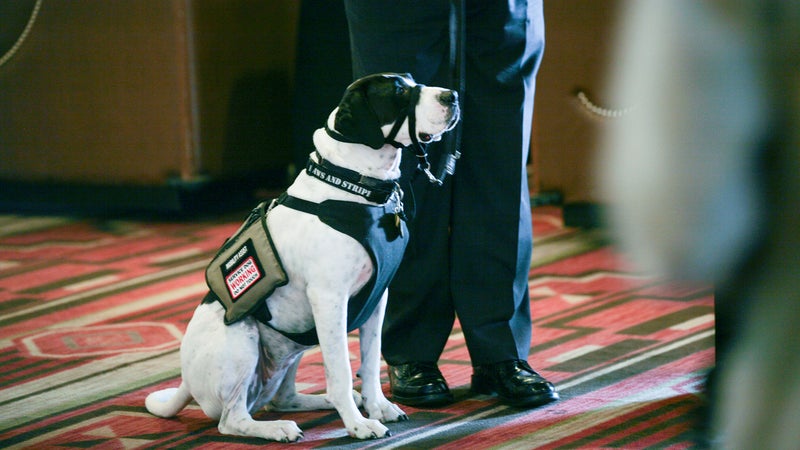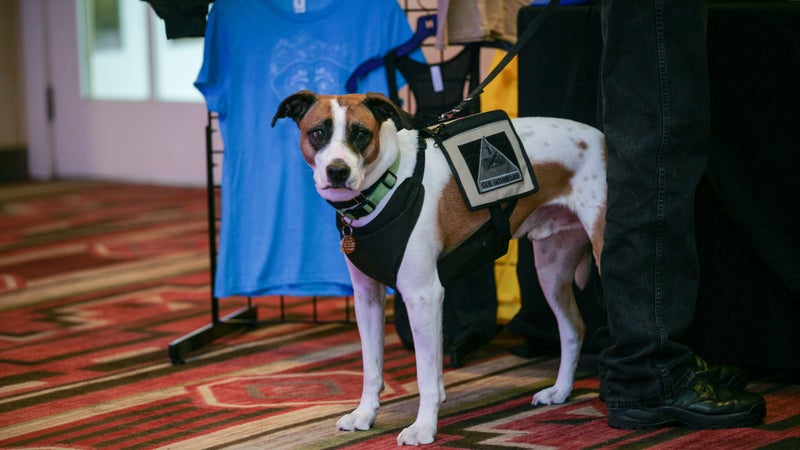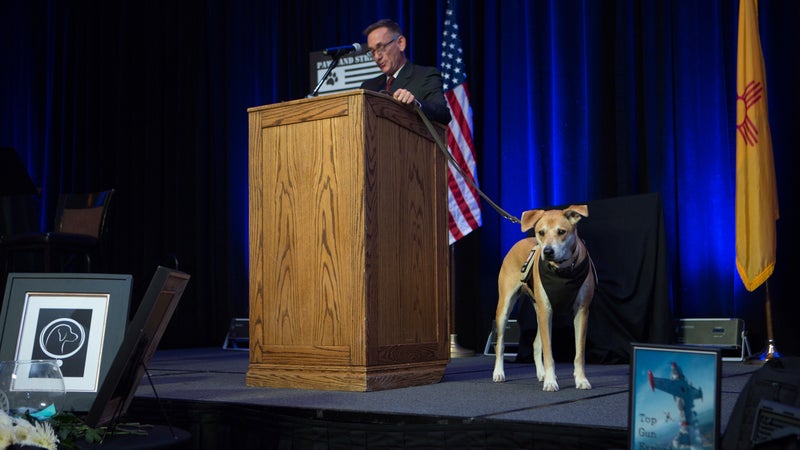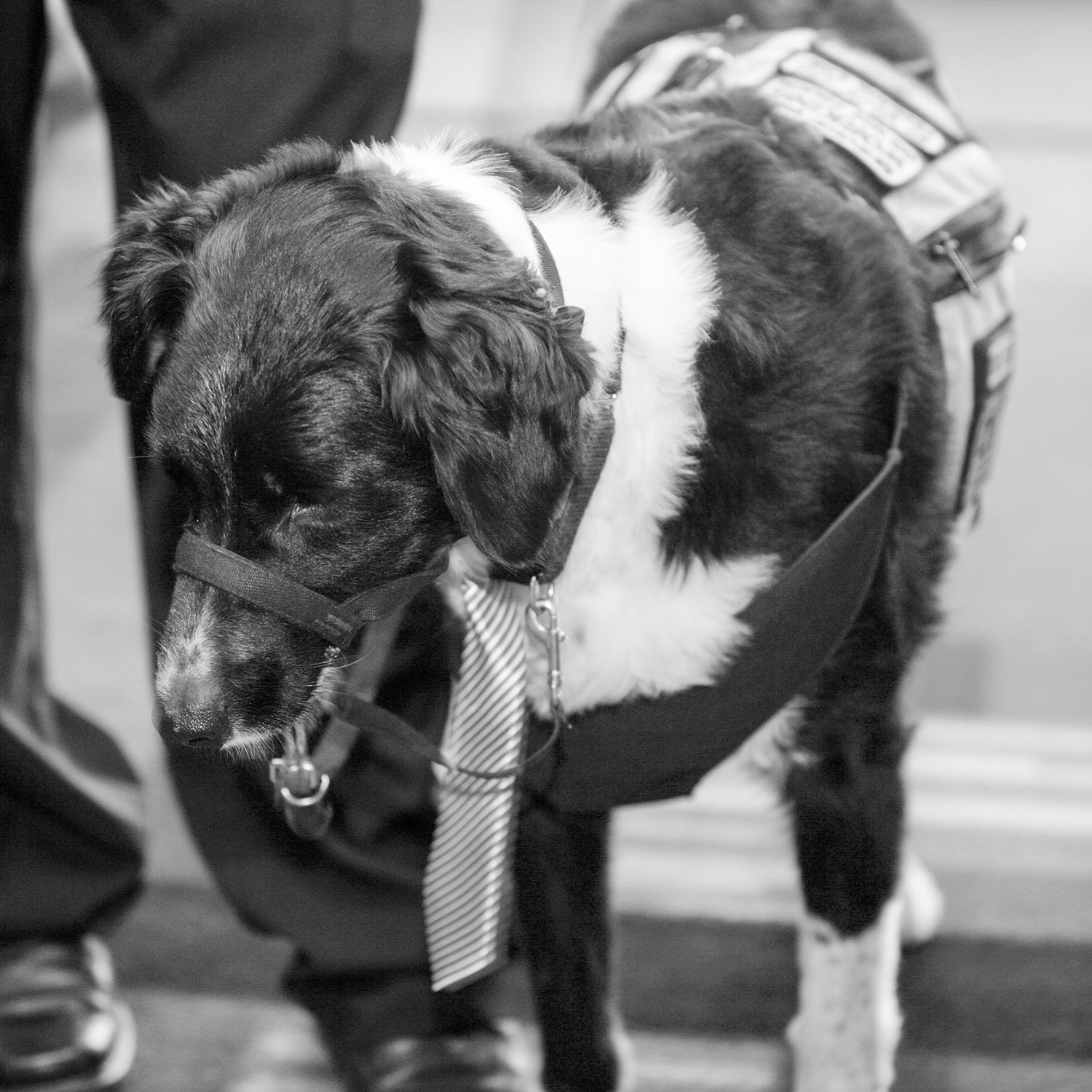Last week, in the ballroom of Hotel Albuquerque, a silver-headed gent in a three-piece suit, shirt open at the throat, perched on a stool and crooned a finger-snapping take on “.” In the foyer, men in slacks and women in heels were greeted by Miss��New Mexico, shimmering in a crown and sash. The lament of “��major rose from a chamber trio situated by the cash bar. Black-clad waiters ferried trays of delicacies—dollops of something, centered like pearls on opalescent lettuce leaves. I cursed myself for not wearing a necktie.
It could have been any gala fundraiser, but the degree to which it was not was revealed when the emcee announced the evening’s primary rule: “Please ask before petting any of the service dogs.”
There, on the vaguely Southwestern-patterned carpet, intermingling with donors, were nine veterans and their short-leashed mutts, bedecked with dog-vests proclaiming their status as service animals. I do not call them mutts to be funny; they were not the butch shepherds of a K-9 unit nor the prissy purebreds of��a show. These were pound dogs, huffing and slobbering, lovable mashups of pit-bull and heeler, husky and mastiff.

Tonight we were celebrating the graduation of these nine “teams,” which each consisted of a rescued dog and a veteran suffering from post-traumatic stress disorder or a brain injury. “We’re saving lives two at a time,” said the event's host, Lindsey Stanek, from the podium. Stanek is the founder and CEO of ,��a New Mexico-based nonprofit that matches disabled veterans with shelter dogs and puts them through a year of training. That training��costs about $5,000 per animal, money the gala was intended to help raise. Stanek announced to a roar of applause that she was more than three-quarters of the way toward her goal of $1.5 million. Tonight's auction, she hoped, would help close the gap.��
I perused the items up for offer. One was a trip for two to a Texas ranch where the winning bidders would board a helicopter and fire machine guns at feral hogs. Another was a custom M-10 assault rifle, its matte steel glimmering faintly beneath the chandeliers. I pocketed my notebook and beelined it for the bar.������

The actual veterans were nothing like the puffed-up alpha-bros in the Helibacon poster. Instead they appeared gentle, tugging at ironed collars like nephews at a wedding, and they spoke more to their dogs than their table-mates.��I asked a vet and his wife why they named the dog Tiberius. “Well, we’re nerds, and it’s the middle name of James Kirk.” Seeing my blank expression, he added, “You know, the captain of the Starship Enterprise.”
I asked what sort of tasks Tiberius performed. “He reminds me to take my medication.” The dog does this by placing a paw on the veteran’s lap, and not dropping it until he swallows his pills. I thought for a moment of my own dog, a 19-pound Mexican mutt named Zora��who prefers to be called Mr. Pickles and who, because my wife was out of town, was home alone, surely curled up on the couch where she was not allowed. Mr. Pickles and I have a similar routine, where twice a day she resolutely bats me with her paw. But it’s not to save my life; it’s because she wants her kibble.��
A second veteran, with whose family I shared a banquet table, had also trained his dog to remind him to take meds. The dog served as a literal crutch, supporting the man whose injured knees, after two tours in Iraq, threatened to buckle. Athena, a sandy-haired herder with a brown spot over one eye, was curled at his feet, beneath the table cloth. Here’s what I found most compelling: “She senses when I’m getting stressed, and she calms me down.” When I asked how the dog could anticipate such anxiety triggers, the vet shrugged and gave a look of bemused astonishment, as if I’d ask him to explain the very miracle of creation.
The actual veterans were nothing like the puffed-up alpha-bros in the Helibacon poster. Instead they appeared gentle, tugging at ironed collars like nephews at a wedding, and they spoke more to their dogs than their table-mates.
The evening’s graduate speaker further illuminated a dog’s curative powers. James Rolls was a bookish man in a dark suit and thick-rimmed glasses; he later told me he taught English at a public high school. He had named his dog Hope. From the podium, he recalled that after Iraq, he lost his 14-year military career, three jobs, and a ten-year relationship. “I contemplated suicide,” he said flatly, silencing the dinner-time clatter. “I couldn’t escape the sadness, anger, and loneliness. So I packed up my truck and drove to Albuquerque. Paws and��Stripes is what I credit with saving my life.”
A lump rose in my throat. I considered my own sadness, anger, and loneliness of the past year. At Standing Rock, I’d been surrounded by assault vehicles, rushed by riot cops, surveilled by helicopter. The president declared the media—that is, me—the enemy of the American people.��Two weeks earlier, I’d watched people��shot at and run down in the streets of Charlottesville. To be clear, I don’t think I’ve suffered like these vets have. And yet for the first time in my life I’m afraid of my own country.��When my nighttime thrashing wakes my wife, I retreat to the guest room, and slap the mattress for Mr. Pickles, who worms her way onto the pillow and somehow puts me to sleep.

The vets and their dogs processed across stage and received their certificates. By the time the auction began, many of the vets and their dogs had begged off for home.��
“I’m blasted,” said one, to his mother.
“W��?”
“I’m tired.”
For those of us remaining, the first item up for bid was the HeliBacon junket, which fetched a cool five grand. An ovation rippled through the room. Minutes later, the M-10 topped it, selling for $5,750. Each of these sales would train one dog, and, no exaggeration, save the life of a veteran on the brink of self-destruction.��
There were more people I wanted to talk to. The guy who’d bought the assault rifle wore a pressed white shirt. The spiffy satchel hung from his shoulder. It could have been anything inside: a sheath of blue prints, a tennis racket, a violin.��
I considered Mr. Pickles shedding white hairs back on the couch. I turned and headed for home.��


